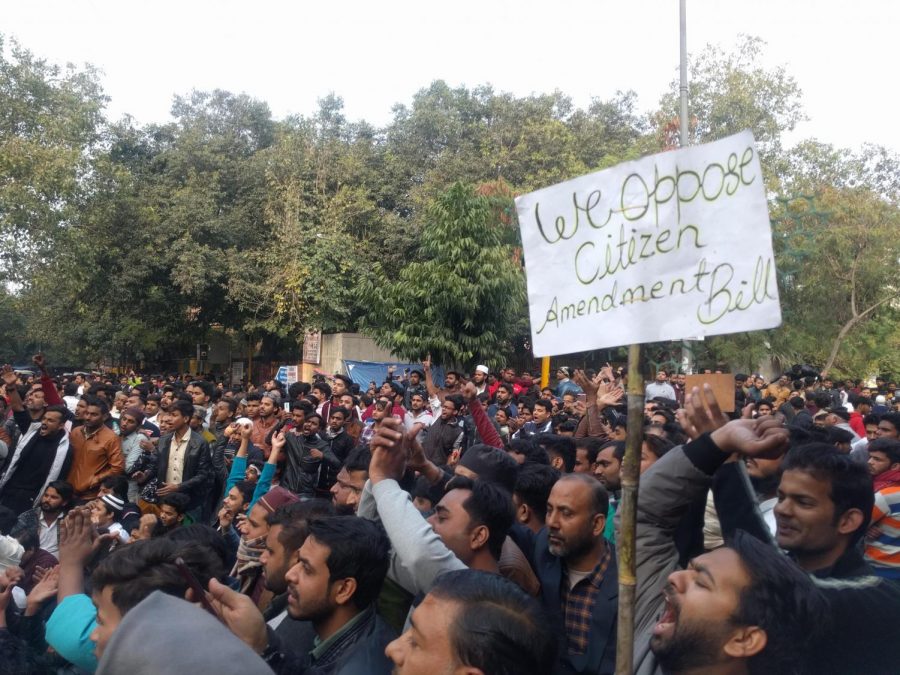An Unrecognizable India: Modi and Islamophobia
DIPLOMAT TESTERMAN VIA WIKIMEDIA
Students from National Islamic University march with locals in opposition to the CAA on Dec. 15, 2019, in New Delhi.The act promises equality but deliberately excludes Muslims.
April 7, 2020
Last spring, I was leaving my McKeon dorm when my friend texted me that people had gathered to protest the Indian Prime Minister staying at the Mandarin Oriental by Columbus Circle. I didn’t know what the uproar was about, so I decided to stop by. I heard the protestors chanting in Hindi/Punjabi slang but I still had little idea what was happening, and, to be completely honest, I didn’t care much. A year later, I saw the video recorded of the protests and it became clear that the uproar was for a secular India.
After Donald Trump won the 2016 presidential election and Narendra Modi was reelected as the Indian prime minister in 2019, as an Indian American, the countries I associated most with my identity became completely unrecognizable. (I say that with complete awareness of the hidden and overt truths of systemic oppression that exist in both countries.)
The sudden rise of nationalism and populism in the U.S. mimicked that of India. In 2014, Modi became the Prime Minister of India with the electoral victory of the Bharatiya Janata Party (BJP). Although the BJP’s nationalist stances today are highly debated, the party itself was founded by a Hindu supremacist who wanted India to be a Hindu nation. The reelection of Modi in 2019, despite news of his inaction during the Gujarat riots with brutal killings of over 700 Muslims, sent a clear message to the world: India is in the midst of turning itself into a country for Hindus alone.
A few months ago, Modi’s government announced the Citizenship Amendment Act (CAA), granting amnesty to religious minorities who illegally immigrated to India from a Muslim-majority country like Afghanistan or Bangladesh if they entered India prior to 2015. While groups such as Hindus, Sikhs, Parsis and Christians are included, the elephant in the room is the purposeful exclusion of Muslims. Additionally, the implementation of a National Register of Citizenship forces millions of Muslims in Assam (including laborers and villagers) to prove their citizenship or fear being taken to internment camps. Now India is looking to implement the registry nationwide, despite only 70% of Indian births occurring with birth certificates.
Protests of the bill were recognized by global news outlets as Hindus, Muslims, Sikhs and others joined together in solidarity to speak out against the implementation of CAA. Unfortunately, the riots in support were equally loud. According to many Indians, it was only a matter of time before heightened levels of Hindu nationalism turned fatal. Lynch mobs targeted people of the Dalit “untouchable” caste and nefarious government officials gave police permission to use “harsh measures,” while Modi stayed silent. Although Modi hasn’t been blatantly vocal about hateful rhetoric, he’s persistent in electing Hindu nationalists who literally rewrite history (books). The true harm of nationalist leaders is the emboldening of nationalist citizens and law enforcement.
The worst comes from the Indian police force who were caught beating up Muslims and forcing them to sing the Indian national anthem — the institutional forces need Muslims to prove their allegiance to India. It eerily resembles how black and brown people in America constantly feel the need to prove their patriotism and love for a country that continuously oppresses them.
On a more personal note, these riots in India remind me of the 1984 genocide of Sikhs in India that’s consistently reduced to the “1984 riots.” My family left India shortly after the genocide, aware of the dangers of staying in this “new India.” As we witness new developments thousands of miles away, the violence feels chillingly familiar. Religious diversity was always India’s greatest strength and weakness.
I feel compelled to write about CAA now because many have expressed their liking of the bill after the March 25 terrorist attack on a Gurdwara, a Sikh temple, in Afghanistan, killing 25 people, including a six-year-old child. Hindu nationalists quickly began advocating for CAA, since Afghan Sikhs could leave Kabul and come to India for safety. However, rather than out of empathy, the attack became another way to push anti-Muslim sentiment.
There are over 200 million Muslims in India who have survived the rule of various empires for hundreds of years and the bloodbath of the partition of India, all to die at the hands of lynch mobs and riots in 2020. Although Modi doesn’t outwardly promote these killings, his silence is deafening. In this new era of India, he should be accountable for his inaction. On the opposite side of the coin, we cannot be silent either.
Growing up in America, I feel so dumbfounded when my friends in high school and college are completely apathetic to politics. I didn’t know where this frustration came from until recently. Many people don’t have the privilege to be apathetic about politics because their livelihoods are deeply affected by the decisions that politicians make. I can turn a blind eye to the violence and the generational impact of the CAA; it won’t affect me in any capacity. But my silence would come at the cost of becoming complicit, and I’ve done enough of that already.












